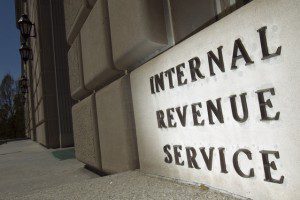
In the furious fallout from the revelation that the IRS flagged applications from conservative nonprofits for extra review because of their political activity, some points about the big picture — and big donors — have fallen through the cracks.
Consider this our Top 6 list of need-to-know facts on social welfare nonprofits, also known as dark money groups because they don’t have to disclose their donors. The groups poured more than $256 million into the 2012 federal elections.
1. Social welfare nonprofits are supposed to have social welfare, and not politics, as their “primary” purpose.
A century ago, Congress created a tax exemption for social welfare nonprofits. Thestatute defining the groups says they are supposed to be “operated exclusively for the promotion of social welfare.” But in 1959, the regulators interpreted the “exclusively” part of the statute to mean groups had to be “primarily” engaged in enhancing social welfare. This later opened the door to political spending.
So what does “primarily” mean? It’s not clear. The IRS has said it uses a “facts and circumstances” test to say whether a group mostly works to benefit the community or not. In short: If a group walks and talks like a social welfare nonprofit, then it’s a social welfare nonprofit.
This deliberate vagueness has led some groups to say that “primarily” simply means they must spend 51 percent of their money on a social welfare idea — say, on something as vague as “education,” which could also include issue ads criticizing certain politicians. And then, the reasoning goes, a group can spend as much as 49 percent of its expenditures on ads directly advocating the election or defeat of a candidate for office.
Nowhere in tax regulations or rulings does it mention 49 percent, though. Some nonprofit lawyers have argued that the IRS should set hard limits for social welfare nonprofits — setting out, for instance, that they cannot spend more than 20 percent of their money on election ads or even limiting spending to a fixed amount, like no more than $250,000.
So far, the IRS has avoided clarifying any limits.
2. Donors to social welfare nonprofits are anonymous for a reason.
Unlike donors who give directly to politicians or even to super PACs, donors who give to social welfare nonprofits can stay secret. In large part, this is because of an attempt by Alabama to force the NAACP, then a social welfare nonprofit, to disclose its donors in the 1950s. In 1958, the Supreme Court sided with the NAACP, saying that public identification of its members made them at risk of reprisal and threats.
The ACLU, which is itself a social welfare nonprofit, has long made similar arguments. So has Karl Rove, the GOP strategist and brains behind Crossroads GPS, which has spent more money on elections than any other social welfare nonprofit. In early April 2012, Rove invoked the NAACP in defending his organization against attempts to reveal donors.
The Federal Election Commission could in theory push for some disclosure from social welfare nonprofits — for their election ads, at least. But the FEC has been paralyzed by a 3-3 partisan split, and its interpretations of older court decisions have given nonprofits wiggle room to avoid saying who donated money, as long as a donation wasn’t specifically made for a political ad.
New rulings indicate that higher courts, including the Supreme Court, favor disclosure for political ads, and states are also stepping into the fray. During the 2012 elections, courts in two states — Montana and Idaho — ruled that two nonprofits engaged in state campaigns needed to disclose donors.
But sometimes, when nonprofits funnel donations, the answers raise more questions. It’s the Russian nesting doll phenomenon. Last election, for instance, California’s election agency pushed for an Arizona social welfare nonprofit to disclose donors for $11 million spent on two California ballot initiatives. The answer? Another social welfare nonprofit, which in turn got the money from a trade association, which also doesn’t have to reveal its donors.
3. The Supreme Court’s Citizens United decision meant that corporations could pay for political ads, anonymously, using social welfare nonprofits.
In January 2010, the Supreme Court ruled that corporations and unions could spend money directly on election ads. A later court decision made possible super PACs, the political committees that can raise and spend unlimited amounts of money from donors, as long as they don’t coordinate with candidates and as long as they report their donors and spending.
Initially, campaign finance watchdogs believed corporations would give directly to super PACs. And in some cases, that happened. But not as much as anyone thought, and maybe for a reason: Disclosure isn’t necessarily good for business. Target famously faced a consumer and shareholder backlash after it gave money in 2010 to a group backing a Minnesota candidate who opposed gay rights.
Many watchdogs now believe that large public corporations are giving money to support candidates through social welfare nonprofits and trade associations, partly to avoid disclosure. Although the tax-exempt groups were allowed to spend money on election ads before Citizens United, their spending skyrocketed in 2010 and again in 2012.
A New York Times article based on rare cases in which donors have been disclosed, sometimes accidentally, explored the issue of corporations giving to these groups last year. Insurance giant Aetna, for example, accidentally revealed it gave $3 million in 2011 to the American Action Network, a social welfare group founded by former Sen. Norm Coleman, a Republican, that runs election ads.
Groups that favor more disclosure have so far failed to force action by the FEC, the IRS, or Congress, although some corporations have voluntarily reported their political spending. Advocates have now turned to the Securities and Exchange Commission, which is studying a proposal to require public companies to disclose political contributions.
The idea is already facing strong opposition from House Republicans.


